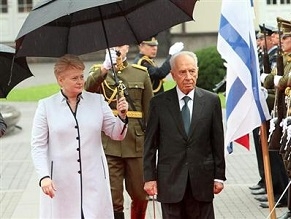|
World Jewish News

Israel's President Shimon Peres is welcomed by his Lithuanian counterpart Dalia Grybauskaite on his arrival in Vilnius on Wednesday.
|
Peres to Lithuanian EU presidency: The EU 'should avoid measures and programs which interfere’ with progress of peace talks
01.08.2013, Israel and the World Israeli President called on the Lithuanian presidency of the EU to avoid placing pressure on Israeli and Palestinian parties “if it wants to assist in the peace process”, at a meeting with Lithuanian counterpart Dalia Grybauskaite on his arrival in Vilnius on Wednesday.
Invoking Israel’s dissatisfaction with the EU’s recent directive calling on all 28 EU member states to refrain from trading with Israeli entities operating beyond 1967 borders, he added that “if the EU wants to support the process led by (US) Secretary of State (John Kerry), it should reject this initiative and allow the parties to determine the boundaries (of a future two state agreement)”.
According to a statement by Peres’ office, his Lithuanian counterpart responded “positively” to the Israeli’s appeal and committed to raising Israel’s concerns over an effective EU boycott of Israeli entities beyond 1967 lines at the next meeting of Europe’s Foreign Ministers.
Meeting with the Israeli statesman a day after the conclusion of tripartite talks between Israeli and Palestinian negotiating teams and Kerry in Washington, Grybauskaite, who heads the Lithuanian presidency of the EU during its current 6-month rotation, assured Peres that “Lithuania takes the EU presidency role very seriously”.
Welcoming the start of a nine-month process of negotiations between Israel and the Palestinian Authority, following Kerry’s confirmation that direct talks will commence in the next two weeks in either Jerusalem or the West Bank, the Lithuanian head of state said that the “EU hopes that after three years of stagnation, good results will come from the process in the form of two states for two peoples living side by side in peace”.
Commenting on the prospects for peace in light of the US-backed resuscitation of direct talks, Peres responded: “The people of Israel look to the peace process bearing fruit and for an accepted solution of two states for two peoples living side by side. The start of negotiation now in Washington is a new beginning for both sides. The people of Israel want peace, there is no other alternative.”
Following the meeting of the two heads of state, which was also attended by Lithuanian Foreign Minister Linas Linkevicius, Peres was due to conduct political discussions with the Lithuanian Prime Minsiter, Parliamentary Speaker and senior government ministers.
The second day of his tour of Lithuania, where he arrived following his tour of fellow Baltic State and EU member Latvia, Thursday will see him attend a memorial to the country’s Holocaust victims at the Ponar valley of the death, the site of pits used for the extermination and exhumation of approximately 70,000 local Jews. As part of the official ceremony, Peres will recite Kaddish (the traditional Jewish memorial prayer) in memory of those victims, 70 years after the liquidation of the renowned Vilnius ghetto.
Lithuania was home to 220,000 Jews before WWII, but 95% perished during the war at the hands of the Nazis and local collaborators. Today, approximately 5,000 Jews are thought to live in the country.
Earlier this year, a study by a Lithuanian genocide centre revealed that up to 2,000 Lithuanians could have been directly responsible for killing Jews in the country during the Holocaust. According to Terese Birute Burauskaite, head of the Vilnius-based Genocide and Resistance Research Center, “these are people who probably held the gun in their hand”.
The news followed recent controversy over the state-funded reburial of Lithuanian Nazi collaborator and WWII leader Juozas Brazaitis. Brazaitis died in exile in the United States in 1974, having assumed power in Lithuania in 1941, when Nazi Germany drove out the Soviets, following their year-long brutal occupation of the country. He was buried in a Cathedral in central Kaunas in May, with the national anthem accompanying the ceremony.
Whilst the Lithuanian state claim Brazaitis’ government tried to restore national sovereignty, Jewish groups insist he was a Nazi collaborator who refused to halt anti-Semitic pogroms and contributing to the climate with a wave of anti-Semitic legislation.
Following the ceremony, unknown attackers daubed Vilnius’ Choral Temple, the only remaining active synagogue in a city which boasted more than one hundred before the Holocaust, in green paint.
Burauskaite confirmed that she will make the full list of suspected war criminals available to justice authorities, who will then be responsible for deciding whether to make the list public. She continued to say that the majority of named suspects had already been sentenced to death by Soviet authorities and there was no evidence “that any murderer of Jews is now living in Lithuania”.
by: Shari Ryness
EJP
|
|
